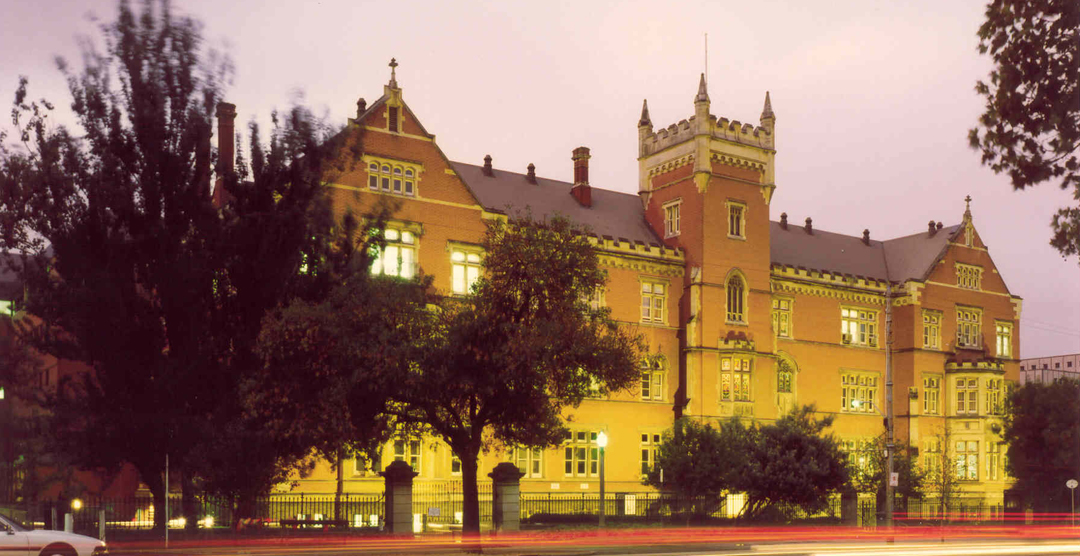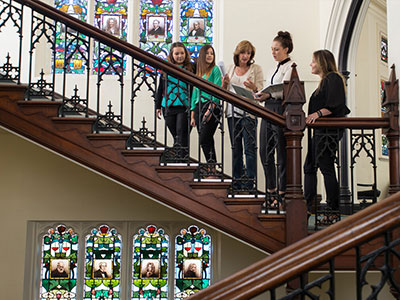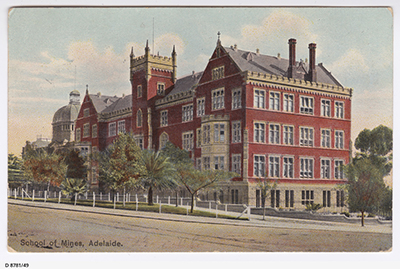
The Brookman Building on North Terrace has a long and proud history
This year, an iconic feature of Adelaide’s cultural and educational precinct on North Terrace, the Brookman Building, celebrates a significant milestone made possible through a generous donation from one of the state's earliest benefactors.
Alumni from the South Australian Institute of Technology (SAIT) will fondly recall attending lectures in the historic Brookman Building on the corner of North Terrace and Frome Road.
Some may remember attending a graduation ceremony in Brookman Hall and taking photographs beneath the famed stained-glass windows in the building depicting eminent scientists and, in a nod to the imperialism of the day, royal figures and emblems of the British colonies.
Between 1960 and 1991, when the University of South Australia was founded, SAIT offered diploma and undergraduate-level programs, including applied science, business, communications technology, engineering, metallurgy, architecture and town planning.

The remarkable stained glass windows have featured in many graduation photographs over the years
Prior to that, the original South Australian School of Mines and Industries opened in 1889 with an inaugural cohort of 375 students housed in classrooms in the corrugated iron annexe of the former Jubilee Exhibition building.
The School quickly outgrew these modest premises and a new fit-for-purpose solution was sought to house the growing student numbers and teaching requirements.
Much like UniSA today, the School focused on building strong connections with industry and ensuring graduates were job-ready and able to meet the skills shortage.

A full house attended the opening of the Brookman Building in 1903, including a mysterious object in the aisle
Officially opening in 1903, the Brookman Building marks its 120th anniversary this year. Research Fellow and Curator of UniSA’s Architecture Museum, Dr Julie Collins, explains how the School innovated to address society’s needs at the time.
“The Brookman Building was a response to increasing demand for technical education for newly emerging professions to serve South Australia’s industrial development at the turn of the 20th century,” Dr Collins says.
“The construction of the Brookman Building for the SA School of Mines and Industries was made possible by the generous donation by its namesake, industrialist Sir George Brookman.”
A gift of roughly $2.5 million at today’s value enabled the School of Mines and Industries to establish a purpose-built home that still stands proudly on UniSA’s City East campus.
Initially reported in 1899 as a gift from an anonymous benefactor, the £10,000 donation was later revealed to be from Sir George Brookman. Brookman subsequently increased his gift by £5000, which was then matched with £25,000 from the South Australian Government.
George Brookman was a Scottish emigrant from Glasgow whose family moved to South Australia in 1852 when he was aged two. He was a successful businessman and made a fortune through his mining companies in South Australia and Western Australia.
As the son of a working-class printer, it is apparent that the entrepreneurial Brookman wanted to give back to the South Australian community once he was in a position to do so.
In another echo of UniSA’s core values, the School of Mines prioritised equity and accessibility of education from the very beginning. This aligned with Brookman’s own values.
In a letter to the School of Mines President Sir Langdon Bonython, Brookman wrote of his motivations for giving: “As I consider the school is doing a good work for the young people of South Australia, and that the privileges offered are open to all, I have pleasure in handing you my cheque for £10,000.”

Known as the “People’s University”, these same ideals are enshrined in UniSA’s founding legislation and remain at the forefront of the vision for the new Adelaide University.
“The Brookman Building stands as a symbol of further education for South Australians, initially housing facilities for technical courses such as mining and wool-classing, but later offering university courses, such as architecture and engineering,” Dr Collins says.
The building itself is architecturally significant. Dr Collins tells how the redbrick Federation Gothic-style building, with its freestone crenellations and tower, was constructed of South Australian materials and designed by the Superintendent of Public Buildings, Charles Owen Smyth. Its historical importance is recognised by its listing on the State Heritage Register.
Other early philanthropists of the time also contributed to the building’s facilities, perhaps inspired by Brookman’s significant gift, such is the power and influence of philanthropy.
The merchant and parliamentarian Sir David Murray donated £2000 towards the library, including a £1500 gift in his Will, and pastoralist John Howard Angas gave £1000 to fund a wool laboratory.

This artwork in the State Library of SA collection
shows the adjacent Exhibition Building, demolished in 1962.
Many of the state’s cultural and educational institutions were generously funded by donors who saw the value to society in these establishments.
Brookman was already a donor to the School of Mines before he was approached for his transformational gift. He also gave to the Art Gallery of South Australia.
Sir Langdon Bonython made five generous gifts to the School of Mines totalling more than £22,000, enabling the construction of the Bonython Jubilee building, which opened in 1940.
Other gifts include £12,500 from the Zinc Corporation to fund research, and Sidney Wilcox gave £4000 for general purposes.
Significant gifts of £100,000 each from the Broken Hill Proprietary Company Ltd (BHP) and Electricity Trust of South Australia (ETSA) helped establish the Whyalla campus.
As Dr Collins reflects, “It is through the gifts of philanthropists that many of the world’s great universities have been able to shape their campuses to become places for quality education and ground-breaking research.”
A bequest is a special way to make a significant gift and create a legacy that can make a real difference to the lives of others. It provides an opportunity to give to the University where you may not find it possible in your lifetime.